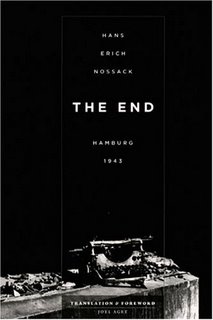
Part of my Smithson project should include (will include) not just a connection to Arendt's protrayal of Eichmann and the traumatic relationship to war in aesthetics, but also the eyewitness accounts of the aftermath of the firebombing of Germany's cities. The quote below, from an article in The Nation that discusses Hans Erich Nossack's book The End (well worth reading) really struck me as resonating with my project's themes (I've highlighted the areas I found most compelling) :
Following the popular success of Sebald's and Friedrich's works, German publishers have printed (or reprinted) a number of accounts by contemporary witnesses, some of which have now been translated into English. One of the most striking is by Hans Erich Nossack, whose book The End describes in spare, unsentimental prose the firebombing of Hamburg in July 1943. Written a few months after the event, this "report" was published after the war in Germany and hovered at the margin of public memory there; it appeared in English translation for the first time last year in a somber, even funereal, edition, the text framed by blackened pages front and back. Nossack's account owes its existence to his good fortune in having left Hamburg three days before the bombing for a summer cabin located some ten miles south of the city. From that vantage point--close enough to see the "flying fortresses" overhead and the huge fire on the horizon but far enough away to be out of physical danger--he experienced the destruction of his home as a spectator. "I was spared the fate of playing a role in it. I don't know why," he writes. Nossack then traveled into the bombed-out city--a modern-day Dante descending into the realm of the dead--to interview thousands of survivors who were so traumatized and confused they could barely speak or register emotion: "Those who were known to have experienced unimaginably frightful hours, who had run through fire with their clothes burning, stumbling over charred corpses...why didn't they cry and lament? And why this indifferent tone of voice when they spoke of what they had left behind, this dispassionate manner of talking, as if telling about a terrible event from prehistoric times?"
On the other hand, Nossack has lost all of his belongings and become a refugee overnight, not just because the house he lived in no longer stands but because he has lost his relation to a lived past: the sight of St. Catherine's tower glimpsed each time he looked up from his desk, the recordings of Handel and Palestrina he played at Christmas, the diaries recording twenty-five years of his inner life as a writer. He is confronted not with a damaged city but with the absence of every familiar landmark--not devastated streets and buildings but crude paths winding over hills of rubble. People huddle together like animals, cook food over open campfires, wander aimlessly in search of basic necessities without thought for the larger political and historical context. In the blink of an eye his world has metamorphosed into a Kafkaesque landscape that is terrifyingly unfamiliar, abstract, almost timeless: "Nothing in our surroundings recalled what we had lost...it was something else, foreign, impossible."



No comments:
Post a Comment